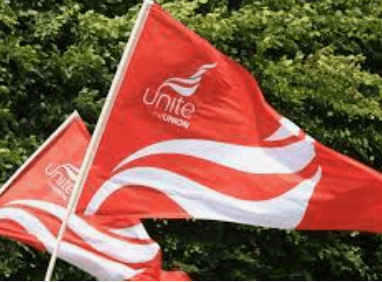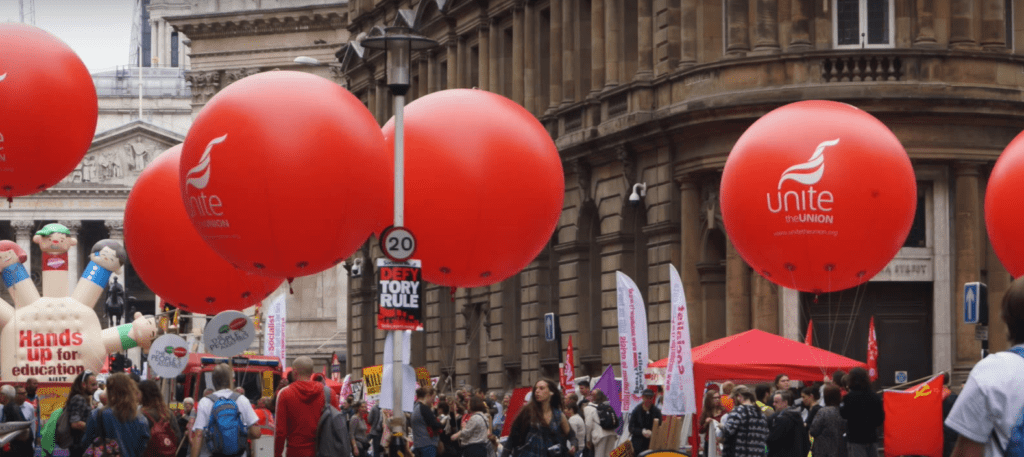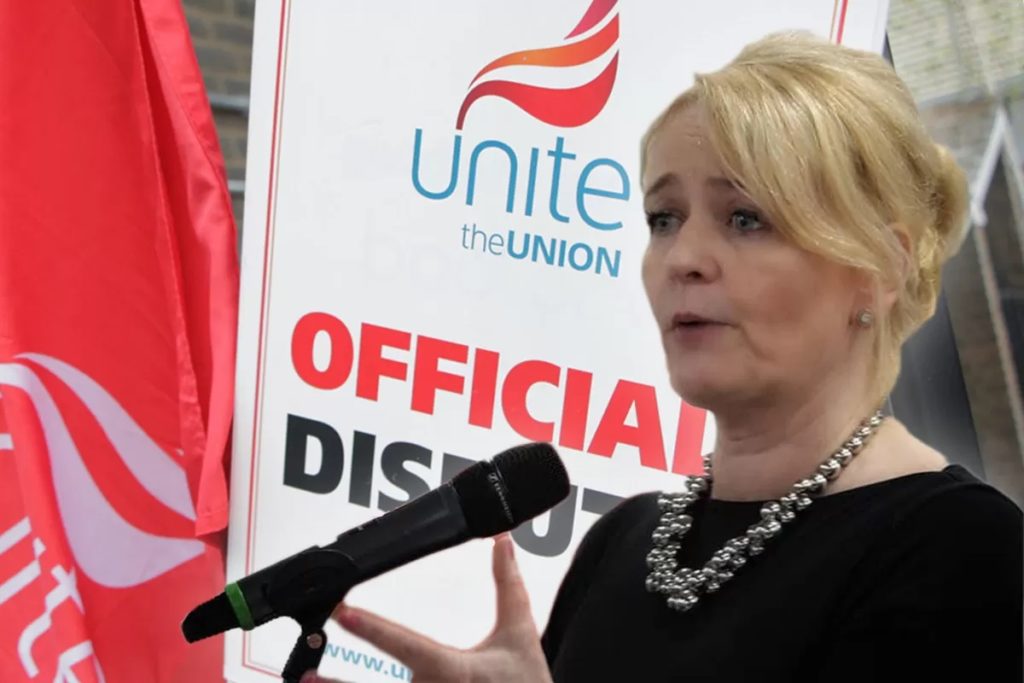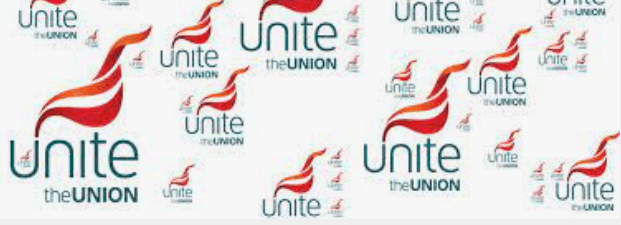By Andy Ford, Unite health rep
A new style of conference
The Unite conference was truly led by the voices of the lay reps, that is to say working class leaders, and what was demonstrated was that the gulf between Unite, one of Labour’s biggest funders, and the policies and outlook of Starmer’s Labour Party could not be greater.
The first and main point is that this was a democratic conference, especially compared to other big unions like Unison, where a third or more of the motions are often ruled out, or the TUC, where everything is composited into grey nothingness.
Very few motions were ruled out of order and, as one left EC member pointed out, at this conference there were not even any ‘EC Statements’ which have been used previously to overwrite branch motions with something mainstream, blander, or less clear. Apparently, new General Secretary, Sharon Graham, said at the pre-conference EC meeting, “No, these are the branch motions, let them go through, or not, as the conference decides”. Let’s hope that this refreshing approach survives contact with the day-to-day reality of being the General Secretary of a union with a million members.
Green Industrial Revolution
We started the first day on the topic of the hour – climate change and the transition to a non-fossil fuel economy. The motion carried, composited from several branch motions, is very close to Corbyn’s ‘Green New Deal’ policy, calling for a transition to wind, tidal, nuclear and solar energy, carbon capture and biofuel, insulation of housing and reforestation of the UK.
It did include nuclear on the mistaken argument that nuclear is low carbon, which it is not, once you factor in Uranium mining and transport; and there was also a nod to “Buy British”, by including “Build Local-Buy UK”, on the basis of reducing delivery miles.
The union called for a ‘worker-led’ transition, with jobs in the new green industrial sectors with the same quality of employment and pay as those in the old fossil fuel and manufacturing industries.
Economy and industry
The manufacturing debate was a key area for Unite, with our sectors in Aerospace, Shipbuilding, Automotive, Chemicals, Pharmaceuticals, Energy, Food and Drink, Engineering and Steel. Conference agreed to set up a Manufacturing Combine, based on shop stewards, to pursue recognition in the supply chain, health and safety enforcement, and again, to lobby for ‘Buy British’, and to develop our Manufacturing Matters campaign into a political, industrial and collective bargaining strategy.
The ‘Balanced Energy Policy’ motion from the Energy and Utilities National Industrial Sector Council (NISC) led to one of only two divided votes at conference, when the use of nuclear power was challenged. Opposition to nuclear power gathered about 10% support from conference, with most delegates obviously not wanting to appear to vote fellow members out of their jobs.

On collective bargaining, Unite policy is now to organise a central team to pursue an organising strategy to identify the major employers in each sector, to create shop steward combines for each industry, to collate our collective agreements, and for the EC to mandate minimum standards for democratic engagement and involvement of our members. You might have thought this would all have been in place already but…evidently it was not!
“politicians have failed…”
The EC speaker, in replying to the debate, made the comment that we need all this because the “politicians have failed”. But firstly, surely the measures outlined are basic trade unionism, and secondly, saying the “politicians have failed” makes a good soundbite but it stops short of identifying the problem of the bureaucratic stranglehold on the Labour Party, and what the unions should be doing about it. Which politicians have “failed”? is the question we ought to ask.
The Fair Tips motion generated a very good debate, with delegates from the hospitality sector explaining how big chains keep some or all of the customers’ tips if they are given by card. We heard from workers in the industry how moves to a cashless economy have made the problem far worse. Unite will now try to set up a Fair Tips accreditation and pressure government (politics again…) to pass Fair Tips legislation.
The anti-casualisation motion from BAe Systems Lancashire branch sought to ban the union from signing agency or contractor agreements and to negotiate reduced agency ratios. But because no-one from the branch was there to move the motion, it nearly fell without even being debated. It was only saved by a local authority delegate who spoke of her horrendous experiences in her council of the divide between agency and permanent staff.
Covid debate
This debate was the most moving of conference, as delegate after delegate came to the rostrum to explain the toll of having worked through the pandemic. Ambulance staff who had to load patients into ambulances knowing that they probably weren’t coming back, as relatives said a hurried goodbye, or else catching Covid themselves after being stuck in the back of an ambulance for 5 hours in a hospital queue.
We heard about the isolation of pressurised home working, under surveillance from managers; the NHS at breaking point, with staff shell-shocked at the end of a bad shift; the distorted, partial and plain wrong Covid “advice” from government agencies and officials, and the fact the HSE did not inspect workplaces even as thousands died; the women workers in the care sector clapped as heroes but treated as expendable, and finally how the rich have prospered and the workers have suffered.
It was an explosive debate and as a consequence, Unite now calls for full sick pay from day one, Universal Credit to be raised to the Living Wage, 90% pay on furlough and a ‘right to disconnect’ for home workers as well as an enquiry into what has gone on, with civil and criminal prosecutions to follow.
Equalities
On equalities Unite now stands for paid leave for those affected by domestic violence, unrestricted access to abortion in Northern Ireland, exemption of disability-related absence from trigger points in sick policies, support for non-commercial Pride, a legal duty on employers to prevent sexual harassment and secure employment rights for all workers to prevent the exploitation of migrant workers. The Social Model of Disability motion made many valuable points on disability, such as the fact that only 17% of disabled people are born with their disability and 83% of disabled people acquire their impairment in life, often as a result of work, and at an average age of 56 years old.

Workers’ rights
On workers’ rights conference reiterated Unite’s demand for a Trade Union Freedom Bill, “to break through organised action if necessary bad laws”, a national day of action in 2022 against the anti-union laws, with an all-reps conference, and to organise a coalition of the willing “should the TUC fail to act”. The union also took a strong stand against remote monitoring of home workers, covert CCTV and spy cops.
In relation to the NHS, Unite now stands for mandated safe staffing levels, staff training throughout careers, bursary for nurses, midwives and AHPs, fairer pension arrangements, mental health support for staff, safe and psychologically safe workplaces, an end to privatisation and the abolition of the internal market. Unite is committed to work with other unions to fight privatisation, support for our pay claim, PPE as needed and “exposing and stopping the corrupt handing over of millions of pounds to private companies”. All in all it is a good programme for the NHS.
On local authority cuts the big news was that Unite now rejects the argument of many councils, including Labour ones, that “we have no choice”. Instead, we call for councillors to set budgets for what is needed, using reserves, and to use the time this buys to create community campaigns for sufficient funding.
This was moved by Greenwich council branch, and the Local Authorities NISC, and it went through unanimously whereas five years ago, we had the spectacle of union delegates who are also councillors telling conference to “grow up and be realistic” and a similar motion got only 25% support, if that. The motion and its support was a testament to the campaigning by Greenwich over many years.
Global solidarity
This debate saw Unite re-affirm support for the Palestinian cause and Kashmir, Justice for Colombia, and support for left, democratic and Kurdish organisations and unions in Turkey.
There was a very good motion on the IHRA definition of anti-Semitism from the Brighton branch, but it unfortunately fell, as no-one from the branch was there to move it, and no-one from the SE Region would move it formally. I thought that was a tremendous let-down of the branch and reflects badly on the way the conference was organised. The motion itself advocated a better? simpler definition from an Oxford University professor, that “Anti-Semitism is hostility to Jews, as Jews, where Jews are perceived as something other than what they are”.
Pensions
The discussion on pensions included many motions from the retired members committees, made into two composites. Unite policy is for a “meaningful” pension, a strategy towards a pension which is 50% of normal earnings, energy-efficient housing, an end NHS cuts, and a state pension above £225 per week. The union also supports the maintenance universal pensioner benefits like winter fuel allowance and free travel, 85,000 homes a year to be built for older people and a Commissioner for Older People.

Political matters
Composite 13, on ‘Preferential Voting’ led to only the second divided vote of conference. The composite rejected the First Past the Post voting system and sought to mandate Unite to explore alternative voting systems, and to carry this debate into the Labour party.
There was a good, democratic debate – points made included the fact that polls show only 17% of people support FPTP, that Labour holds many urban seats with huge majorities, that Tory governments get elected on a minority of the vote, that Labour got more votes in 1951 but lost the election, and that we could see new left wing parties developing.
Against the motion it was argued that the Labour Party would fracture, that the link to constituencies was important, that a PR system would hand even more power to party lists, that it would mean permanent coalitions and no-one getting what they vote for. As it turned out, conference voted for a review of the voting system, by about 60% to 40%.
Another surprise was that the idea of a new Clause IV, including the nationalisation of the commanding heights of the economy, went through unanimously where five years previously it had only got 10% support. This is extremely significant and is very far removed from Starmer’s version of what the Labour Party should put forward.
The downsides to the Unite conference were the frequent branch motions lost because there were no movers and the small number of branch motions. It really is an odd system, where branches can send motions but not delegates. Only 40 branches put in motions, out of a notional 3,000, which is an extremely low figure. Including motions from sectional committees, there were only 162 motions in total, which is poor, from a union of a million members.
Pressure on regional officers
These figures reflect the slow motion car crash in the union’s grassroots with a minimum of one third of branches inactive and another third being run by retired members. The loss of grass roots activists and reps, in turn, piles the pressure on the Regional Officers as all too often there is no-one there to do the basic casework.
Some of this is to do with the modern workplace with speed-ups, LEAN production, smaller and more dispersed workplaces and the loss of jobs in traditional industries. But the problem has been made far worse by what amounts to a policy of centralisation and neglect by the Unite leadership of its own branches and workplace reps.
We can only hope that new General Secretary, Sharon Graham, will see the problem and take the steps necessary to address it. Rules conference is due next year and the left usually puts forward ideas such as paid organisers to focus on rebuilding branches and Trades Councils, a branch based conference, annual conferences, and election of senior officials instead of appointment by the General Secretary. Maybe these motions too will go from 10% support to unanimity.
Despite all this the conference showed that democracy is very much alive and kicking in Unite and that a socialist programme is more or less the mainstream among the union activists who form the bedrock of Unite the Union.




Good report on conference, looking forward to seeing more in details for the foundation for branch meeting report back.
Excellent Unite policy conference report Andy. Very accurate and all the main points captured. I agree clause 4 was a (welcome) surprise. I also believe the Labour Party affiliation amendment will be submitted at the next rules conference again. This time it will carry a lot more support if the party continue on the Tory light path.